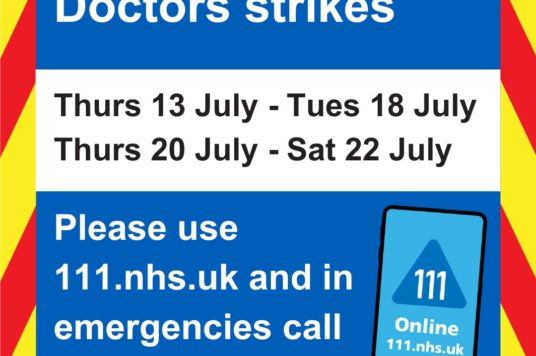Hospital group says fresh round of junior doctors’ strikes could prove most challenging yet
A wave of back-to-back strikes will severely impact hospital services over the coming week – and will follow the busiest month of 2023 for one hospital group.
St George’s, Epsom and St Helier hospitals have faced significant pressure in recent weeks, with emergency attendances in June ramping up.
Last month about 880 people visited one of the Group’s three emergency departments (EDs) daily – about 10% more than is usual.
The emergency departments also saw extraordinary demand some days – including one record-breaking Monday when they had their busiest day ever.
Now, ahead of this week’s junior doctors’ strikes, which get underway at 7 am on Thursday and continue until 7 am the following Tuesday (18 July), members of the public have been warned to expect disruption and longer waits, and to avoid visiting the ED when it’s not an emergency.
There will also be an additional challenge when hospital consultants go on strike just days after the junior doctors’ action ends. That walk-out is due to take place on Thursday 20 July and Friday 21 July.
Dr Richard Jennings, Group Chief Medical Officer for St George’s, Epsom and St Helier University Hospitals and Health Group, said: “June was very busy and that’s also continued into July – which makes it more difficult when we’re trying to prepare for the inevitable challenges strike action brings.
“Ahead of each round of strikes I’ve urged the public to take steps to help us and to come to our EDs in an emergency only – and I am making the same request again now when it is more important than ever. We have a very tough week ahead and we need your support to ensure we can prioritise care for our sickest and most seriously ill patients.”
The hospital group recognise that it’s going to be the first time this year that a junior doctors’ strike has taken place over the weekend and into a Monday.
This has prompted further concern, as Monday is normally the busiest day of the week in the Group’s EDs. This was even more pronounced last month, with 1,000-plus average daily attendances on Mondays – significantly higher than a typical day of 800.
Dr Jennings added: “If people need medical help – during the strikes or at any other time – we would encourage them to contact NHS 111 online for 24/7 advice on where to go and what to do if they have an illness or injury. When it’s a real emergency or life-threatening, of course, people should always call 999 or go to an emergency department.”
Strikes will also impact other services at the hospitals, and will mean that some appointments, procedures and operations may be postponed to ensure emergency care can be prioritised. Patients will be contacted directly if their appointments are rescheduled, and should continue to come forward for care as normal unless they hear otherwise.
NHS 111 online should always be the first port of call when you have a health need that’s not an emergency, as it will direct you to the best place to get help for your symptoms. Pharmacies, meanwhile, can offer advice and over-the-counter medicines for a range of minor illnesses, such as coughs, colds, sore throats, and aches and pains. Some pharmacies will be open at weekends, and you can find your nearest one here: https://www.nhs.uk/service-search/pharmacy/find-a-pharmacy
In a life-threatening emergency, you should always call 999 or go to an emergency department.
If you need mental health support in a crisis, and live in Kingston, Merton, Richmond, Sutton or Wandsworth you can call South West London’s 24/7 Mental Health Crisis Line on 0800 028 8000. There’s more information about this service here: https://www.swlstg.nhs.uk/patients-carers/crisis-support/mental-health-support-line
For adults, young people, and children in Surrey and North East Hampshire, 24-hour support is available by calling: 0800 915 4644. There’s more information here: https://www.sabp.nhs.uk/our-services
While very hot weather is not currently forecast, people should also take steps to stay safe in the sun.
Look out for people who may struggle to keep cool and hydrated, such as elderly relatives or neighbours; keep windows closed when the room is cooler than outside; and stay hydrated. You should also stay out of the sun between 11 am and 3 pm, apply suncream regularly, and wear a hat.
Notes to editors
Monday’s ED attendances in June were as follows:
- 5th: 918
- 12th: 1,241 (busiest day ever)
- 19th: 961
- 26th: 1,001
This year’s ED average daily attendances are as follows:
- January: 771
- February: 809
- March: 833
- April: 786
- May: 832
- June: 878


